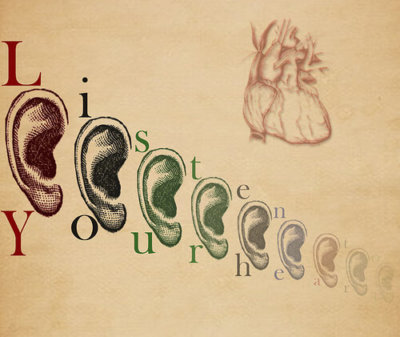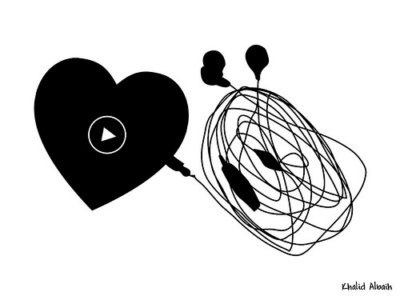How to Listen to Yourself – Do You Know What You REALLY Think and Feel?

By: Ky
by Andrea M. Darcy
You spend years of your life thinking you are on track, and on paper it all seems a success. And then one day you stop and realise that you actually aren’t happy. What went wrong?
There’s a good chance that you never learnt how to listen to yourself, but have mistaken the chatter in your head for the real you.
So what is the secret to listening to yourself?
- How do you tell what thoughts are the real you, and what thoughts are just what you’ve been taught to think?
- How do you recognise when you are just listening to your inner critic?
- What are the best techniques to hearing yourself?
How to listen to yourself
Try to integrate some of the following steps each day. You are cultivating a relationship here, after all, albeit with yourself.
1. Learn about values and what yours are.
Your values are what deeply matter to you. If you don’t know your true values, and are living out ones that aren’t really a fit, you might constantly feel restless and discontent.
To identify your values, look at at your life and what choices bring you undeniable joy and excitement. If you think your value is money, then why is it you hate your job as a financial planner but love volunteering? Is it possible your true value is giving?
If you aren’t sure if a value you think is yours is truly yours, try imagining a life spent living only that value. If you think your value is power, imagine a life where all you have to do is give commands by yourself every day. Would you be happy… or feel lonely? If the latter, maybe your value is actually leadership. Then think of where the value comes from. Is it yours, or something you cling to as your family or friends have that value?
2. Dig out your core beliefs.
Your core beliefs are viewpoints you have about life, others, and yourself that you have taken to be fact. But really, they are simply beliefs you have chosen to take on board. Oftentimes these beliefs stem from childhood, and are passed on to you by your

By: Khalid Albaih
family. They sound like things such as, ‘the world is a dangerous place’, ‘you can’t trust anyone’, and ‘money is the root of all evil’.
The problem with core beliefs is that until you recognise them, they run your unconscious and inform all of your decisions. And they stop you from listening to yourself, especially if who you have become runs contrary to one of your beliefs.
It takes work to be honest about what your core beliefs are and to dig them out, and often the assistance of a coach or counsellor. But removing the ones that cause you to make bad decisions and replacing them with ones that bring more ease to your life is a truly powerful process.
3. Recognise your inner critic.
Watch out for a voice in your head that sounds like a parent telling you what to do in a way that makes you feel resigned or put down. It’s rarely your true self, but instead your inner critic. It might sound like your mother or father, or another guardian or mentor, if they were hard on you when you were growing up. It often speaks using terms like “should”, “must”, and “you better”, and also likes to compare you to others.
4. Bust through the clutter.
One of the reasons you might struggle to hear your true self is that you just have so many thoughts it’s like trying to tune in to one radio station out of hundreds. Aside from the inner critic already mentioned you might be listening to your inner child (poor me, nobody loves me, nothing I do matters). And then you might suffer from anxieties, and worries about the past and the future.
So how to hear yourself through the chatter? Get a pen and paper and try free form journalling. Just write down as fast as you can all the worries in your head, the judgements, the anger , the sadness, and the self-criticism, not worrying if it’s legible.
What you’ll find happening is that you write your way through to a true voice. At first it might take time to get just a sentence or two that feels like your true self stating what it wants, but if you practise this technique often you might find your real voice showing up not long after the pen hits the page.
Some people find this technique of busting through head clutter can work by speaking out loud. Rant out all the things you are annoyed about or worried about until you hear yourself saying something that resonates. Just be careful that you are in a truly private place!
5. Tap in daily.

By: Minoru Nitta
Another incredibly effective way to burst through mind clutter and listen to yourself is mindfulness. A practise of now moment awareness best done daily, over time you will find yourself becoming more and more efficient at being able to zone in to how you are really feeling right now, beyond the worries and thoughts.
6. Indulge your imagination.
If you are only listening to your rational mind, you are only listening to a part of yourself.
If you are trying to listen to what you truly want and it sounds outrageous, instead of stopping the train of thought, try saying, well, ‘imagine if’… and see what comes up for you. And try the next step, asking good questions, which also uses your creativity.
7. Constantly ask yourself good questions.
A good question often begins with ‘what’ or ‘how’ over ‘why’. Simply put, why questions lead down rabbit holes and to self-criticism, whereas ‘what’ and ‘how’ questions look forward and come up with solutions (for more on the process, read our article, “How to Ask Good Questions”.
Try asking yourself wild and big questions about the future to learn surprising things about yourself. For example, if you were a billionaire, what would your perfect day look like? If you were spending a week with your perfect partner, what would you do? If you had one week left to live, how would you spend it?
8. Try new things weekly.
So many of us are sure we know what we like, but really are just doing things we have been taught are the right things to like doing, or things our parents did, or our friends all do.
Combat this by trying something new weekly. Try a different class at the gym, eat foreign food you’ve never tried, talk to someone you wouldn’t think you had anything in common with.Some things might be a fail, but every now and then you’ll get a buzz from something unexpected that can be a pathway to a new part of yourself.

By: Iqbal Osman
9. Learn to let go.
Holding on to things you have outgrown is like building a dam that holds back your access to your true self. And this includes relationships. If you are constantly hanging around with people who you no longer have anything in common with and really deep down aren’t sure you even like anymore, just because you have known them since childhood, you are stopping yourself from your own potential.
10. Practise self care often.
Just like the friends we are kindest to are the ones who trust us most, you might find that the nicer you are to yourself, the more you open up to yourself.
At the very least self-care often creates time for you to hear yourself in the first place. How can you treat yourself nicely this week? Is it a long hot bath instead of the social engagement you don’t really want to go to? Finally dealing with your finances so you can stop panicking?
If you are experiencing a lot of anxiety lately, and find it really hard to listen to yourself or know who you are, self-care might involve going to see a counsellor or psychotherapist. They are trained not just at listening but at asking just the right questions to help you discover parts of yourself you didn’t know existed. So their listening might lead to you hearing yourself in ways you didn’t even know were possible.
Why is listening to yourself so important?
As well as a tendency to fulfil someone else’s idea of success and happiness, not listening to yourself can also lead to psychological struggles. This can include codependency, where you take your identity from pleasing others instead of taking it from who you really are. And it can also involve depression, because it is draining to feel lost inside.
If you have real struggles with knowing who you are at all, feel you change completely and lose yourself in every relationship, and can’t stop making impulsive decisions, there is a chance you have borderline personality disorder, which does require additional support.
It takes commitment and effort to differentiate between the things you’ve been taught to believe are fact versus what is actually true for you personally.
But it’s worth the effort, because when you know how to listen to yourself, you make choices that lead towards the life you actually want, not the one you think you should want. And this inevitably lowers your stress levels and raises your self-esteem and contentment.
Need help knowing who you are? We connect you with some of London’s most highly regarded talk therapists in central London. Or use our sister site to book with a UK-wide registered therapist today.
 Andrea M. Darcy is a mental health and wellbeing expert with training in person-centred counselling and coaching. Find her on Instagram @am_darcy
Andrea M. Darcy is a mental health and wellbeing expert with training in person-centred counselling and coaching. Find her on Instagram @am_darcy





Hello there! I know a lot of people who love themselves, respect their values, listen to their intuition, but they are still lonely and broke. On the other hand, I had a friend who never loved himself and was very clingy and needy. He once committed suicide over a failed relationship. All of a sudden, he found the love of his life that was a stunner. They have been happily married for fifteen years and his wife is very caring. In addition, my friend has become very rich and successful. Honestly, I am not against self-love, but it has recently become a cliche. In my opinion, there are no rules in this universe. Things are as they are.
Ali, we entirely agree that there are no rules. And that self-love is at best a concept as over the course of even a day we experience so much our sense of self shifts. But we would say that this is all from your perspective. Those people who seem to love themselves and respect their values, do you know what they do behind closed doors? Or the thoughts about themselves that they secretly have? Often those very types, secretly, hate themselves, and they are putting on a show. This is why so often you hear about suicides where everyone is going, ‘but he seemed to together’. As for the clingy needy person, self love and respect is not about seeming together or perfect. It has nothing to do with that. It’s simply about accepting who you are. If he was a quivering mess but didn’t judge himself he’d be far more attractive to a partner than someone who seemed perfect but had hidden negative core beliefs. As for your idea their relationship is perfect, again, who knows? People are complicated. Our perspective will never be the full story, unless we read minds ;). But this is not as interesting as the fact that you are here, making this comment. What in you has bought you here? What about you is it that you are uncomfortable with? Where did you get the idea that you must be perfect to be loved? that you must entirely love and accept yourself to attract a ‘stunner’? Is that what you look for in a relationship, looks? And being rich and successful? If anything, we are sensing that you are very hard on yourself and perhaps extend that to trying to find a ‘perfect’ partner? What if you didn’t need to be perfect to be loved, and what if the perfect person from you is far from perfect by general standards? All interesting things to think about! Good luck.